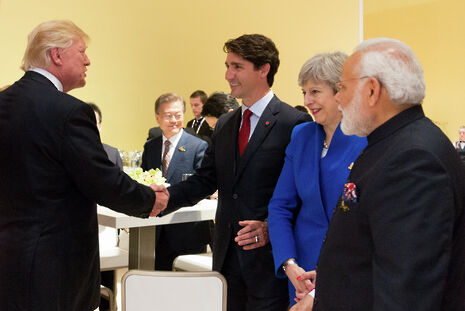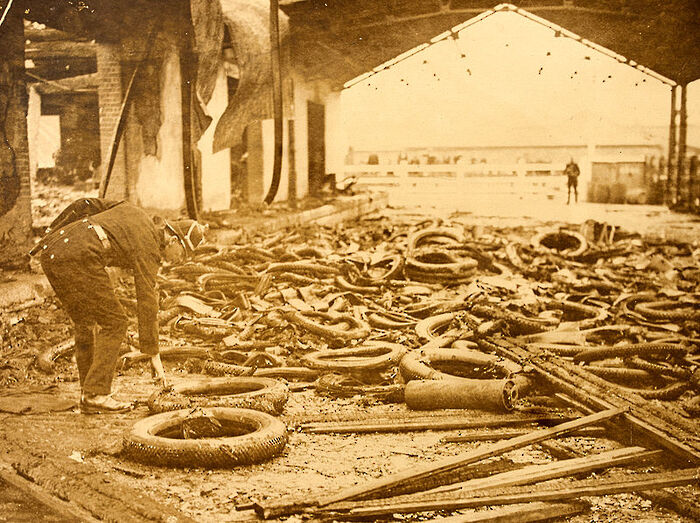A ‘cult of personality’ is essential in modern politics
Theresa May is doing a good job on Brexit but is suffering from bad PR, argues columnist Connor MacDonald, comparing her leadership with that of Canadian Prime Minister Justin Trudeau

For the past month, Theresa May’s leadership has publicly teetered on the precipice. While machinations behind the scenes are likely less-than-lethal, the constant sniping in the press seems to have made her time in office terminal. Publicly, she has no political capital to spend whatsoever. Her magnum opus will be the Brexit negotiations, a task foisted on her by a divided Conservative Party.
Meanwhile, in greener pastures, a certain Prince Charming has a twinkle in his eye. Two years into his term, and Justin Trudeau looks like he is going to bound into office again with a thumping majority, Tony Blair reincarnate (if Canadians knew more about British politics, this is what they would say).
“While [May] forcefully repudiates the ‘grid politics’ so eloquently practiced by the Cameroons, she has found herself outgunned on nearly every public front”
Obviously, the marked contrast between Theresa May and Justin Trudeau provides an object lesson in the importance of having a good PR team. To say that the former’s seems to have taken lessons from Basil Fawlty is as obvious as saying the latter seem to have created a modern phenomenon.
However, while this difference is obvious, what I find interesting is what it says about our approach to politics more generally. Both Canada and the United Kingdom share a majoritarian Westminster system; we expect strength and decisiveness from our leadership. Reading Andrew Rawnsley’s Servants of the People, a book about Blair’s first term, a line stuck out to me: “no government has tried harder at doing nothing”. Casting my eyes across the pond, I can’t help but see the same phenomenon play itself out again.
The Trudeau government has not proven itself the progressive force it pledged to be in the last election. It has raised taxes negligibly for the wealthiest, but promises about reforming the electoral system, maintaining a detailed and rigorous scrutiny of finances, doing something – anything – for the environment, promising a new relationship with indigenous peoples…the number of progressive totems no longer honoured is rather long. But no worries – Trudeau is bringing in a carbon tax (at some point!) and we are legalizing weed. Real Change (one hell of an election slogan).
I’m not a progressive, so a number of these priorities – or at least how the Liberal Party planned to tackle them – did not chime with my preferred policy priorities. However, I also can’t deny that the sweeping change the Prime Minister promised to his supporters has fallen woefully short of the platform on which he ran. Yet, where are the enemies at the gate?
Conversely, Theresa May’s campaigns, for both the leadership and the country at large, have been laser-focused on delivering Brexit. This is partly out of necessity since Brexit sucks up all the oxygen, but also, I think, out of a sense of purpose. Theresa May is the one who gets on with the job. At this I believe she has been fairly successful; Phase One results were hailed as a triumph, the EU is moving closer to a trade agreement, and she has managed to keep Conservatives all in one tent (mostly). She has played the cards she has fairly well.
What she has not done is fill the empty media space. While she has been focused on Brexit, her opponents in both the Conservative and Labour Parties have used the time to define and undermine her. While she forcefully repudiates the ‘grid politics’ so eloquently practised by the Camerons, she has found herself outgunned on nearly every public front. Either by some misguided design or the constraints of Brexit negotiations, she finds herself without allies and without a megaphone.
Returning to Trudeau, no one could accuse him of not practising grid politics. His socks, which seem to be the PR equivalent of a nuclear bomb, have become a meme unto themselves. He, if not his party or his government, defines cool. In a testament to his sheer ability to suck up all the airtime himself, a third of Canadians do not know the name of the leader of the opposition (it’s Andrew Scheer).
His government works very hard at looking good – at keeping the curtains down when they need to be. Their policy successes thus far are minimal. This may change as the term comes to a close, but it is undeniable that his policy delivery pales in comparison to that of the current UK Conservative Party. This is the political world we live in now. We might claim to like substance, and to hate the spin and hypocrisy, but we’re the biggest hypocrites around
 News / Judge Business School advisor resigns over Epstein and Andrew links18 February 2026
News / Judge Business School advisor resigns over Epstein and Andrew links18 February 2026 News / Gov grants £36m to Cambridge supercomputer17 February 2026
News / Gov grants £36m to Cambridge supercomputer17 February 2026 News / Hundreds of Cambridge academics demand vote on fate of vet course20 February 2026
News / Hundreds of Cambridge academics demand vote on fate of vet course20 February 2026 News / CUCA members attend Reform rally in London20 February 2026
News / CUCA members attend Reform rally in London20 February 2026 News / Union speakers condemn ‘hateful’ Katie Hopkins speech14 February 2026
News / Union speakers condemn ‘hateful’ Katie Hopkins speech14 February 2026










